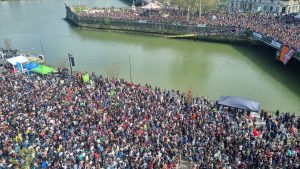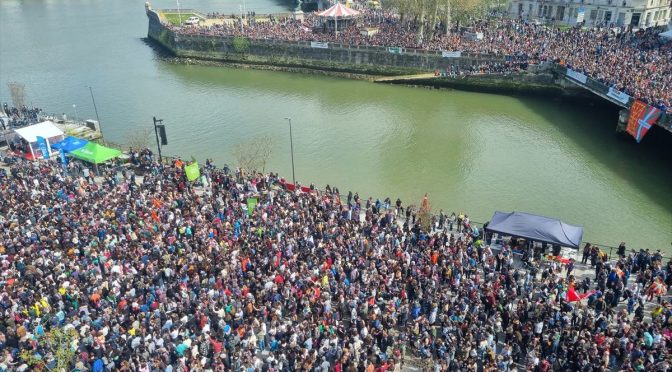Earlier this month, the Basque Country witnessed what has become an amazing spectacle in support of the Basque language. Starting on March 14 in Irun and ending in Baiona after 11 days and more than 2,700 kilometers, thousands upon thousands of people ran across the Basque Country in support of Euskara. It is an event like no other in the world, though other places are trying to mimic its success. This is Korrika.

- Korrika, which means running in Basque, started in 1980. The first race took place between Oñati, Gipuzkoa and Bilbo, Bizkaia over the course of 9 days, starting on November 29 and ending on December 7. It was organized by AEK – Alfabetatze Euskalduntze Koordinakundea or Coordinadora de Euskaldunización Alfabetización – an organization that promotes the learning of the Basque language across the entire Basque Country.
- Ever since that first event, Korrika is held every two years, usually over 10 days, and passes via a different route throughout the seven historical provinces of the Basque Country – some 200 cities and towns have been visited during the 44 year history of the event.
- Korrika has been described as one of the largest pro-language demonstrations in the world and the longest relay race on the planet. Some 600,000 runners participate, and the relay goes straight through the 10 days with no breaks – even in the dead of night, runners keep running, passing a wooden baton that was used in the first race, to the next runner.
- Korrika is not only a demonstration, but a fund raiser in support of the Basque language. Every kilometer – the race this year covered 2,700 kilometers, or nearly 1700 miles – is sold to a sponsor who then leads that kilometer. Supporters follow with banners and music, giving the whole event a festive air.
- The baton also contains a secret message in Basque that is read at the end of the race by a Basque personality. This year, it was read by Garazi Arrula, an author who authored the message. She called the situation of the language both political and urgent and stressed how in Baiona, the city where the 2024 edition finished, the Basque language is not even official. She called the Korrika a “hungry people” and echoed the motto of the 2024 race: “harro herri” or “proud people.”
- Korrika has become a world-wide phenomenon, with runs wherever there are Basques. For example, Boise holds its own version of Korrika, though much shorter in length. In 2024, many cities across the globe participated, from Reno to Tokyo and from Necochea, Argentina to Lapland, Finland. Further, Korrika has inspired other regions to hold similar events, including Brittany starting in 2008, Catalonia in 1993, and Wales in 2014.
A full list of all of Buber’s Basque Facts of the Week can be found in the Archive.
Primary sources: Korrika, Korrika.eus; Korrika, Wikipedia
Thanks to Robert Uselton for suggesting this Basque Fact of the Week.
Discover more from Buber's Basque Page
Subscribe to get the latest posts sent to your email.



Good summary of the Korrika, a very inspiring event. There was also a local event in Montréal, Qc, organized by Euskaldunak Québec.
Greetings,
Running is good for the body and the mind. What will happen after graduating from a Basque language only to a young person applying for employment if they speak, read and write only in Basque and the rest of the world does not understand Basque?
Monique
They do that to help preserve their language and culture.
Ok. they preserve their language and culture. But if they only speak, read and write Basque and not Spanish, French, English or another language, then they are limited to stay within the Basque country to survive. Like it or not, we live in a global world. If they cannot communicate with others around the world, the world will not knock on the Basque’s door.
This is old wine in new bottle. It goes back to Sabino Arana, who invented the Nationalist Basque Movement, with accents of traditionalism, somewhat racist that evolved later into some model of Christian democrat in the hope of uniting the Kingdom of Navarre which is not shared between France and Spain. In my opinion, the reunification of the Navarre is the discombobulated dream of some people who do not live in the Basque country.
Monique Durham